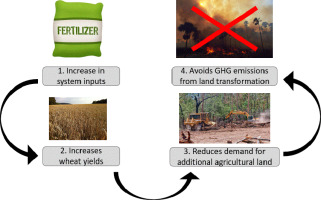当前位置:
X-MOL 学术
›
Sci. Total Environ.
›
论文详情
Our official English website, www.x-mol.net, welcomes your feedback! (Note: you will need to create a separate account there.)
Climate change mitigation for Australian wheat production.
Science of the Total Environment ( IF 9.8 ) Pub Date : 2020-03-27 , DOI: 10.1016/j.scitotenv.2020.138260 Aaron T Simmons 1 , Annette L Cowie 2 , Philippa M Brock 3
Science of the Total Environment ( IF 9.8 ) Pub Date : 2020-03-27 , DOI: 10.1016/j.scitotenv.2020.138260 Aaron T Simmons 1 , Annette L Cowie 2 , Philippa M Brock 3
Affiliation

|
Climate change threatens humanity yet the provision of food that supports humanity is a major source of greenhouse gases, which exacerbates that threatening process. Developing strategies to reduce the emissions associated with key global commodities is essential to mitigate the impacts of climate change. To date, however, there have been no studies that have estimated the potential to reduce GHG emissions associated with the production of wheat, a key global commodity, at a national scale through changes to wheat production systems. Here, we assess the consequences for net GHG emissions of Australian wheat production from applying three changes to wheat production systems: increasing the rates of fertiliser N to achieve the water-limited yield potential; increasing the frequency of lime applications on acid soils; and changing a two year cropping rotation (from wheat-wheat to legume-wheat). We predict that applying these three changes across the key wheat growing regions in Australia would increase production of wheat and legumes by 17.8 and 5.3 Mt, respectively, over the two-year period. Intensifying Australian production would reduce the need to produce wheat and legumes elsewhere in the world. This would free up agricultural land at the global scale and avoid the need to convert forestland and grassland to cropping lands to meet increasing global demands for wheat. We find that applying these changes across wheat growing zones would reduce the GHGs associated with Australian wheat production by 18.4 Mt CO2-e over the two-year period. Our research supports the notion that intensification of existing agricultural production can provide climate change mitigation. The impacts of intensification on other environmental indicators also need to be considered by policy makers.
中文翻译:

缓解澳大利亚小麦生产的气候变化。
气候变化威胁着人类,但提供支持人类的食物却是温室气体的主要来源,加剧了这一威胁过程。制定减少与全球主要商品有关的排放量的战略对于减轻气候变化的影响至关重要。然而,迄今为止,尚无研究评估通过改变小麦生产系统在全国范围内减少与作为主要全球商品的小麦生产相关的温室气体排放的潜力。在这里,我们通过对小麦生产系统进行以下三种改变来评估澳大利亚小麦生产的温室气体净排放量的后果:增加肥料氮的使用率以达到限水的单产潜力;增加在酸性土壤上施用石灰的频率;并更改了两年的轮作周期(从小麦小麦到豆类小麦)。我们预测,在澳大利亚的主要小麦产区应用这三个变化,将在两年期间分别将小麦和豆类的产量提高17.8和5.3Mt。增加澳大利亚的产量将减少世界其他地方生产小麦和豆类的需求。这将在全球范围内释放农业用地,并且无需将林地和草地转变为耕地以满足全球对小麦日益增长的需求。我们发现,在小麦种植区中应用这些变化将在两年期间将与澳大利亚小麦生产相关的GHG减少18.4 Mt CO2-e。我们的研究支持这样一种观念,即现有农业生产的集约化可以缓解气候变化。决策者还需要考虑集约化对其他环境指标的影响。
更新日期:2020-03-27
中文翻译:

缓解澳大利亚小麦生产的气候变化。
气候变化威胁着人类,但提供支持人类的食物却是温室气体的主要来源,加剧了这一威胁过程。制定减少与全球主要商品有关的排放量的战略对于减轻气候变化的影响至关重要。然而,迄今为止,尚无研究评估通过改变小麦生产系统在全国范围内减少与作为主要全球商品的小麦生产相关的温室气体排放的潜力。在这里,我们通过对小麦生产系统进行以下三种改变来评估澳大利亚小麦生产的温室气体净排放量的后果:增加肥料氮的使用率以达到限水的单产潜力;增加在酸性土壤上施用石灰的频率;并更改了两年的轮作周期(从小麦小麦到豆类小麦)。我们预测,在澳大利亚的主要小麦产区应用这三个变化,将在两年期间分别将小麦和豆类的产量提高17.8和5.3Mt。增加澳大利亚的产量将减少世界其他地方生产小麦和豆类的需求。这将在全球范围内释放农业用地,并且无需将林地和草地转变为耕地以满足全球对小麦日益增长的需求。我们发现,在小麦种植区中应用这些变化将在两年期间将与澳大利亚小麦生产相关的GHG减少18.4 Mt CO2-e。我们的研究支持这样一种观念,即现有农业生产的集约化可以缓解气候变化。决策者还需要考虑集约化对其他环境指标的影响。



























 京公网安备 11010802027423号
京公网安备 11010802027423号